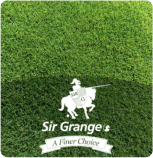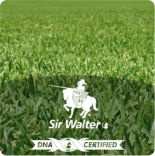The Tiny Troublemakers
When it comes to maintaining a lush and healthy lawn, couch mites, or turf mites, are not the first thing that comes to mind. These minuscule pests can wreak havoc on your beautiful green carpet, causing damage that might be mistaken for other lawn problems. In this blog, we'll delve into the world of couch mites, covering how to identify them, recognize symptoms, and, most importantly, how to treat and prevent them.
Identifying Couch Mites
Couch mites are incredibly small, making them nearly invisible to the naked eye. These arachnids measure just about 0.2 millimeters, which is roughly the size of a grain of sand. Their tiny stature can make them challenging to identify directly. However, you can look for the following signs/symptoms to confirm their presence.

Symptoms of Couch Mite Infestation
Couch mite infestations can be mistaken for other common lawn problems like drought stress or nutrient deficiencies. Understanding the symptoms can help you differentiate them from other issues:
-
Silvered Grass Blades: The silvery sheen on grass blades is a primary symptom of couch mite damage.
-
Patches of Dying Grass: Couch mites tend to feed in groups, leaving patches of damaged or dying grass in their wake.
-
Stunted Growth: An infested lawn may exhibit slower growth and an overall unhealthy appearance, even with proper care.
-
Increased Susceptibility to Stress: Infested grass is more vulnerable to environmental stressors, such as drought or extreme temperatures, due to the damage caused by couch mites.
- Runner Damage: Mites, like couch mites, feed by piercing the plant cells and sucking out the contents, which can lead to distorted or swollen plant tissues. When these mites feed on grass runners, it can cause the runners to lift or swell, creating irregular growth patterns on your lawn.

Treatment for Couch Mite Infestation
Once you've confirmed a couch mite infestation, taking prompt action is essential to prevent further damage. Here are some treatment options:
-
Chemical Control: In severe infestations, consider using acaricides or miticides specifically designed for lawn mite control. Follow the product instructions carefully and apply during the recommended times of the year.
-
Beneficial Predators: Introduce natural predators like ladybugs, lacewings, or predatory mites to your lawn. These beneficial insects can help keep couch mite populations in check.
-
Regular Watering: Adequate and consistent watering can help reduce the stress on the grass, making it less susceptible to mite damage. Deep watering is often more effective than frequent shallow watering.
-
Cultural Practices: Proper lawn care, including regular mowing, fertilizing, and aeration, can promote healthy grass that's more resilient to mite infestations.
-
Our Green Beacon: Operated by Jimboomba Turf, our innovative service deploys a lawn care expert to your residence. This professional, often referred to as our 'Lawn Yoda,' will conduct a thorough assessment of your lawn, diagnose any issues, and provide expert guidance and solutions for their effective management.
![]()
Preventing Couch Mite Infestations
Prevention is always better than treatment. Here's how you can protect your lawn from couch mite infestations:
-
Monitor Regularly: Keep a close eye on your lawn, especially during dry and hot periods, when mite activity is most likely.
-
Maintain Good Lawn Health: Proper lawn care practices, such as mowing at the correct height and fertilizing can help build strong grass that's less attractive to mites.
-
Reduce Stress: Avoid over-fertilization, which can stress the grass and make it more susceptible to mite infestations.
-
Practice Integrated Pest Management (IPM): Implement a holistic approach to lawn care, focusing on pest prevention and early detection.
Couch mites may be small, but their impact on your lawn can be significant. Recognizing the signs, understanding the symptoms, and knowing how to treat and prevent infestations are essential for maintaining a healthy and vibrant lawn. With the right knowledge and proactive measures, you can keep your turf mite-free and enjoy the lush, green lawn you love.
Please feel free to contact us at (07) 3114 8281 to access expert guidance or to schedule a consultation visit from our knowledgeable lawn consultant, who will skillfully diagnose and address any lawn-related concerns you may be encountering.















